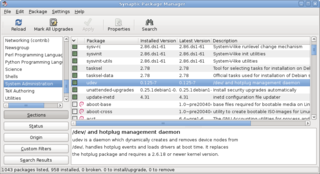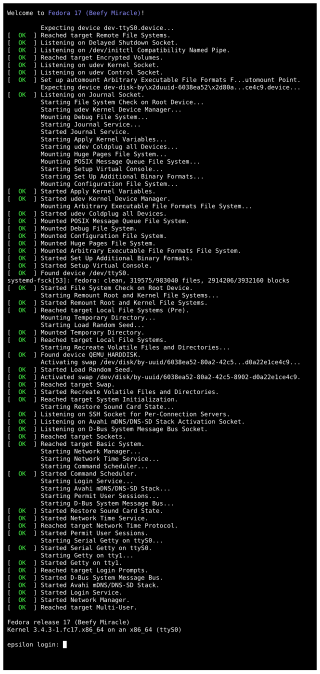| Original author(s) | Graham J Williams |
|---|---|
| Stable release | 2.14 |
| Written in | Python |
| Operating system | Linux |
| Type | Package management system |
| License | GPLv2+ [1] |
| Website | wajig |
Wajig is a simplified wrapper to Debian's package management system dpkg/APT. Wajig provides the functionality of apt-get, dpkg, dpkg-deb, apt-cache and other tools. These tools launch as a subprocess. Wajig also provides extra functionality beyond that of the stock apt and dpkg tools. For example, the command wajig sizes provides a listing of all installed packages and the amount of disk space they require, from smallest to largest.
Wajig provides a consistent and intuitive interface to all packaging commands, unlike the traditional apt or dpkg package managers. Wajig serves as a wrapper for the underlying apt/dpkg commands.
wajig also provides a package install and removal log. This log provides an audit trail that help an administrator with diagnostics package diagnostics.
Wajig is written in Python, and is licensed under the GNU General Public License. The wajig package also includes a GUI front-end, called gjig, providing graphical buttons for most of the features.
Gnome-jig (gjig) provides a GNOME interface as part of the wajig package. While running gjig, hovering the mouse over the buttons provides a balloon with a clear description of the function that the button provides.

Debian, also known as Debian GNU/Linux, is a Linux distribution composed of free and open-source software developed by the community-supported Debian Project, which was established by Ian Murdock on August 16, 1993. The first version of Debian (0.01) was released on September 15, 1993, and its first stable version (1.1) was released on June 17, 1996. The Debian Stable branch is the most popular edition for personal computers and servers. Debian is also the basis for many other distributions, like PureOS, Ubuntu, Pardus, and Linux Mint.

A package manager or package-management system is a collection of software tools that automates the process of installing, upgrading, configuring, and removing computer programs for a computer in a consistent manner.

Advanced package tool, or APT, is a free-software user interface that works with core libraries to handle the installation and removal of software on Debian, and Debian-based Linux distributions. APT simplifies the process of managing software on Unix-like computer systems by automating the retrieval, configuration and installation of software packages, either from precompiled files or by compiling source code.
dpkg is the software at the base of the package management system in the free operating system Debian and its numerous derivatives. dpkg is used to install, remove, and provide information about .deb packages.

The Yellowdog Updater Modified (YUM) is a free and open-source command-line package-management utility for computers running the Linux operating system using the RPM Package Manager. Though YUM has a command-line interface, several other tools provide graphical user interfaces to YUM functionality.

Portage is a package management system originally created for and used by Gentoo Linux and also by ChromeOS, Calculate, Sabayon, and Funtoo Linux among others. Portage is based on the concept of ports collections. Gentoo is sometimes referred to as a meta-distribution due to the extreme flexibility of Portage, which makes it operating-system-independent. The Gentoo/Alt project was concerned with using Portage to manage other operating systems, such as BSDs, macOS and Solaris. The most notable of these implementations is the Gentoo/FreeBSD project.
deb is the format, as well as filename extension of the software package format for the Debian Linux distribution and its derivatives.

Synaptic is a GTK-based graphical user interface for the APT package manager used by the Debian Linux distribution and its derivatives. Synaptic is usually used on systems based on deb packages but can also be used on systems based on RPM packages. It can be used to install, remove and upgrade software packages and to add repositories.

slapt-get is an APT-like package management system for Slackware. Slapt-get tries to emulate the features of Debian's (apt-get) as closely as possible.

debconf is a software utility for performing system-wide configuration tasks on Unix-like operating systems. It is developed for the Debian Linux distribution, and is closely integrated with Debian's package management system, dpkg.

Maemo is a software platform originally developed by Nokia, now developed by the community, for smartphones and Internet tablets. The platform comprises both the Maemo operating system and SDK. Maemo played a key role in Nokia's strategy to compete with Apple and Android, and that strategy failed for complex, institutional and strategic reasons.
dselect is a computer program used to manage software packages in the Debian operating system.

aptitude is a front-end to APT, the Debian package manager. It displays a list of software packages and allows the user to interactively pick packages to install or remove. It has a search system utilizing flexible search patterns. It was initially created for Debian, but has appeared in RPM-based distributions as well.

GNOME Commander is a 'two panel' graphical file manager for GNOME. It is built using the GTK+ toolkit and GVfs.
The Debian build toolchain is a collection of software utilities used to create Debian source packages (.dsc) and Debian binary packages from upstream source tarballs.

Hildon is an application framework originally developed for mobile devices running the Linux operating system as well as the Symbian operating system. The Symbian variant of Hildon was discontinued with the cancellation of Series 90. It was developed by Nokia for the Maemo operating system. It focuses on providing a finger-friendly interface. It is primarily a set of GTK extensions that provide mobile-device–oriented functionality, but also provides a desktop environment that includes a task navigator for opening and switching between programs, a control panel for user settings, and status bar, task bar and home applets. It is standard on the Maemo platform used by the Nokia Internet Tablets and the Nokia N900 smartphone.

Ubuntu Software Center, or simply Software Center, is a discontinued high-level graphical front end for the APT/dpkg package management system. It is free software written in Python, PyGTK/PyGObject based on GTK.

systemd is a software suite that provides an array of system components for Linux operating systems. The main aim is to unify service configuration and behavior across Linux distributions. Its primary component is a "system and service manager" – an init system used to bootstrap user space and manage user processes. It also provides replacements for various daemons and utilities, including device management, login management, network connection management, and event logging. The name systemd adheres to the Unix convention of naming daemons by appending the letter d. It also plays on the term "System D", which refers to a person's ability to adapt quickly and improvise to solve problems.
DebWrt is a discontinued, niche Linux distribution mainly installed on embedded systems. It was built on top of an OpenWrt base which was used to load a fully functional version of Debian from the RootFS stored on the attached USB storage device. For easy installation and deinstallation of packages it relied on the dpkg Package management system. DebWrt used the command-line interface of Bash. There was no web-based GUI interface.